What impact does rheumatoid arthritis have on daily life? Carenity members share their story!
Published 30 Nov 2021 • By Candice Salomé
According to the NHS, rheumatoid arthritis affects more than 400,000 people, or about 0.6% of the UK population. Rheumatoid arthritis is a severe chronic inflammatory disease that affects the joints. The joints are gradually destroyed, leading to disability in the long term.
But what are the repercussions of rheumatoid arthritis on patients in their daily lives? How do rheumatoid arthritis flare-ups manifest themselves? What do patients do about it? What do experts advise?
We launched a survey the United Kingdom, the United States, and France to gather the opinions and feelings of Carenity members!
Discover their answers below!

132 members took part in our survey in the UK, US, and France
We conducted a survey from 2 to 21 November, 2021 involving 132 Carenity members with rheumatoid arthritis living in the United Kingdom, the United States, and France.
94% of them have been diagnosed with rheumatoid arthritis by a healthcare professional and 6% are in the process of being diagnosed.
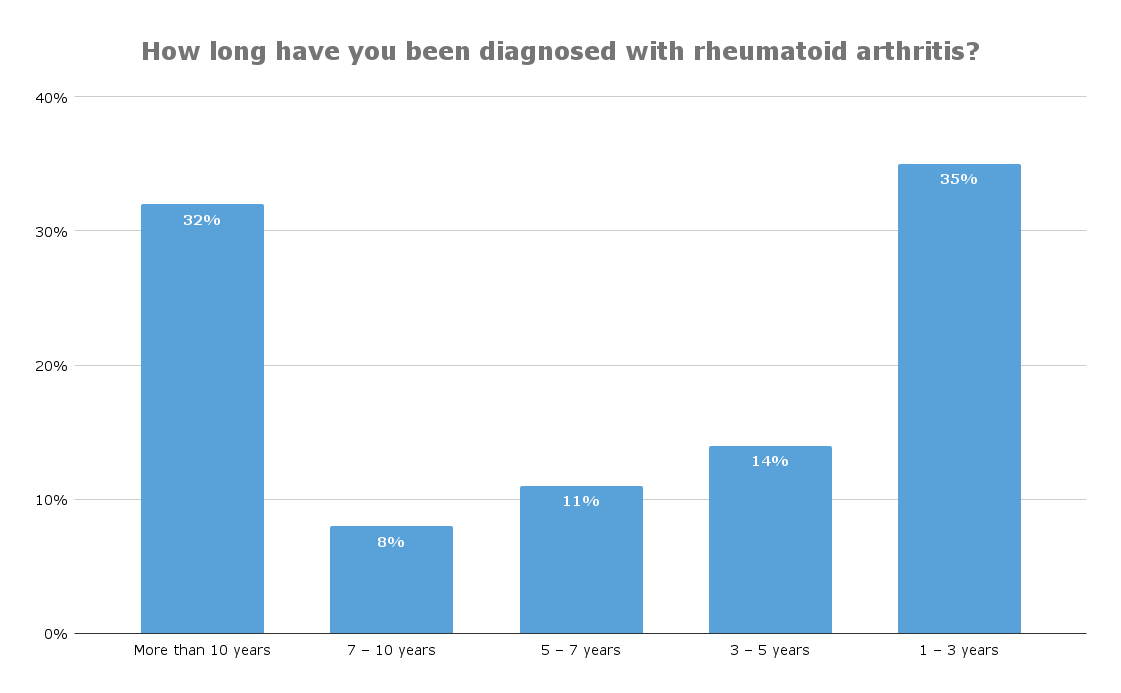
In a majority of cases, Carenity members have received their diagnosis recently (between 1 and 3 years for 35%) or many years ago (more than 10 years for 32% of members).
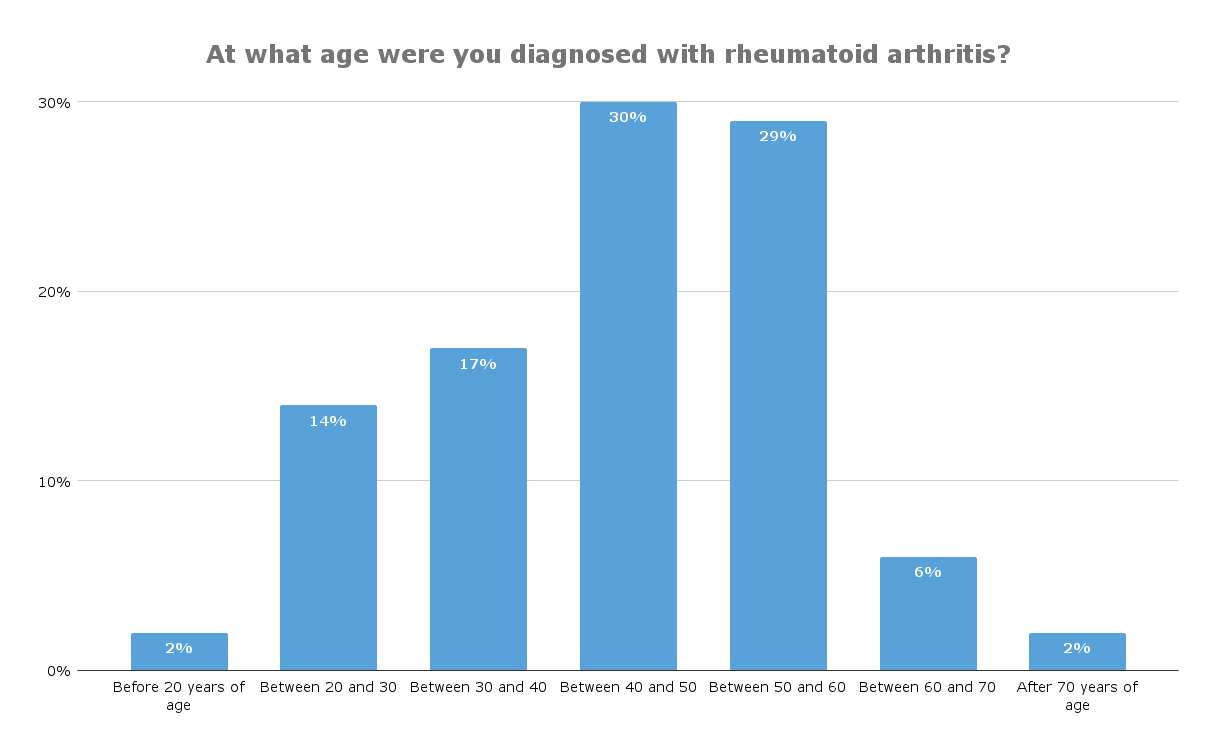
For 59% of Carenity members, the diagnosis of rheumatoid arthritis was made between the ages of 40 and 60.
The first sign of rheumatoid arthritis is: joint pain, mainly in the hands
We asked respondents to describe the first symptoms they experienced. They answered:
- Joint pain for 85%,
- Joint stiffness for 58%,
- Swelling for 55% of Carenity members
Some also experienced intense fatigue, skin redness in the painful areas, or a feeling of heavy or tired legs.
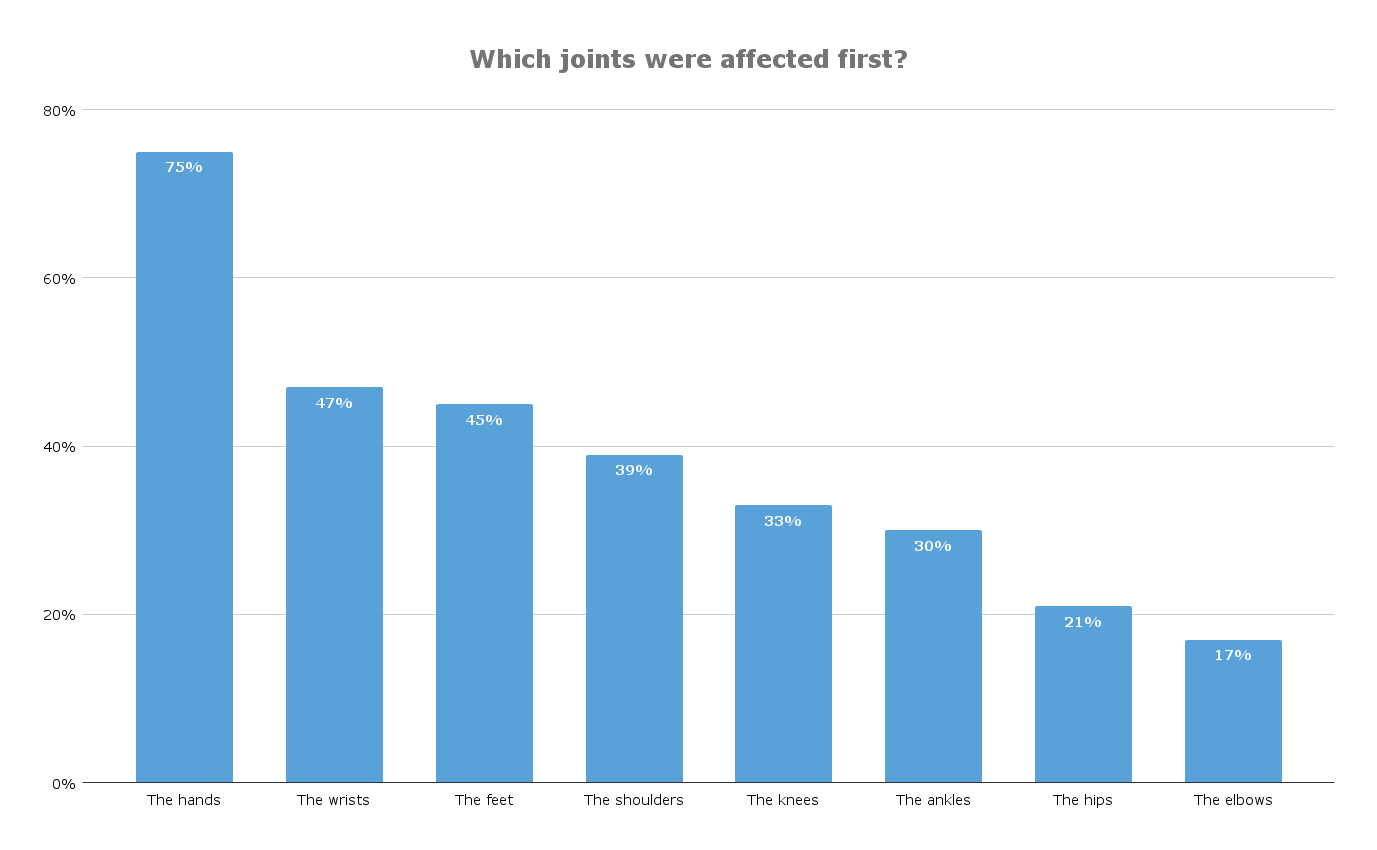
The hands were the first joints affected (78%), followed by the wrists (47%) and feet (45%). Respondents had experienced pain in at least three different areas on average from the onset of the RA.
Complications of rheumatoid arthritis: intense fatigue and Sjögren's syndrome
The consequences of rheumatoid arthritis, apart from its well-known symptoms, are numerous.
We asked members about the complications of RA on their health. Here is what they told us:
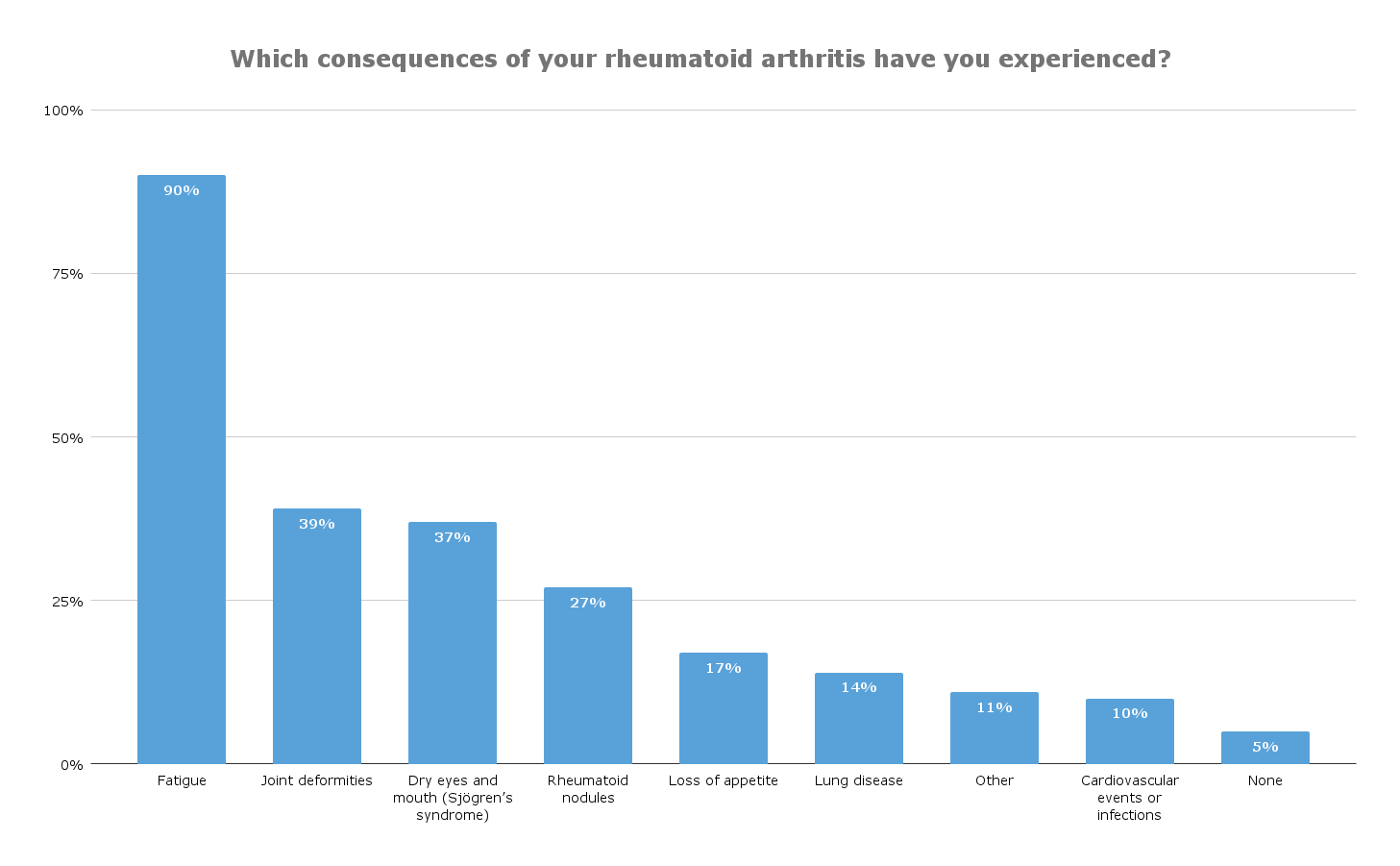
Almost all respondents experience severe fatigue related to their rheumatoid arthritis. 39% have joint deformities, 37% experience dry eyes and mouth (Sjögren's syndrome) and 27% have rheumatoid nodules (irregularities in the tissue under the skin).
The majority of members who answered "Other" to this question had widespread pain in the jaw, back and shoulders, but also in the wrists.
Impact of rheumatoid arthritis on daily life: physical activity is put on hold
We also asked Carenity members about the impact of rheumatoid arthritis on their daily lives. Patients have been severely affected by the symptoms.
The aspects of their lives that are the most impacted by rheumatoid arthritis are as follows:
 Impact on physical activity – 84%
Impact on physical activity – 84%
 Impact on mood – 83%
Impact on mood – 83%
 Impact on leisure time and hobbies – 62%
Impact on leisure time and hobbies – 62%
 Impact on professional life – 57%
Impact on professional life – 57%
 Impact on social life – 55%
Impact on social life – 55%
 Impact on romantic relationships – 48%
Impact on romantic relationships – 48%
 Impact on family life – 48%
Impact on family life – 48%
Non-drug treatments for rheumatoid arthritis: Carenity members' choice
The goal of rheumatoid arthritis treatment is multifaceted: On the one hand, symptomatic treatment reduces pain and inflammation and thus improves patients' comfort. On the other hand, disease-modifying treatment slows down the evolution of the disease and thus prevents the appearance of complications (articular and extra-articular).
Nevertheless, in parallel with drug treatments, Carenity members also opt for alternative medicines or choose to change their lifestyle.
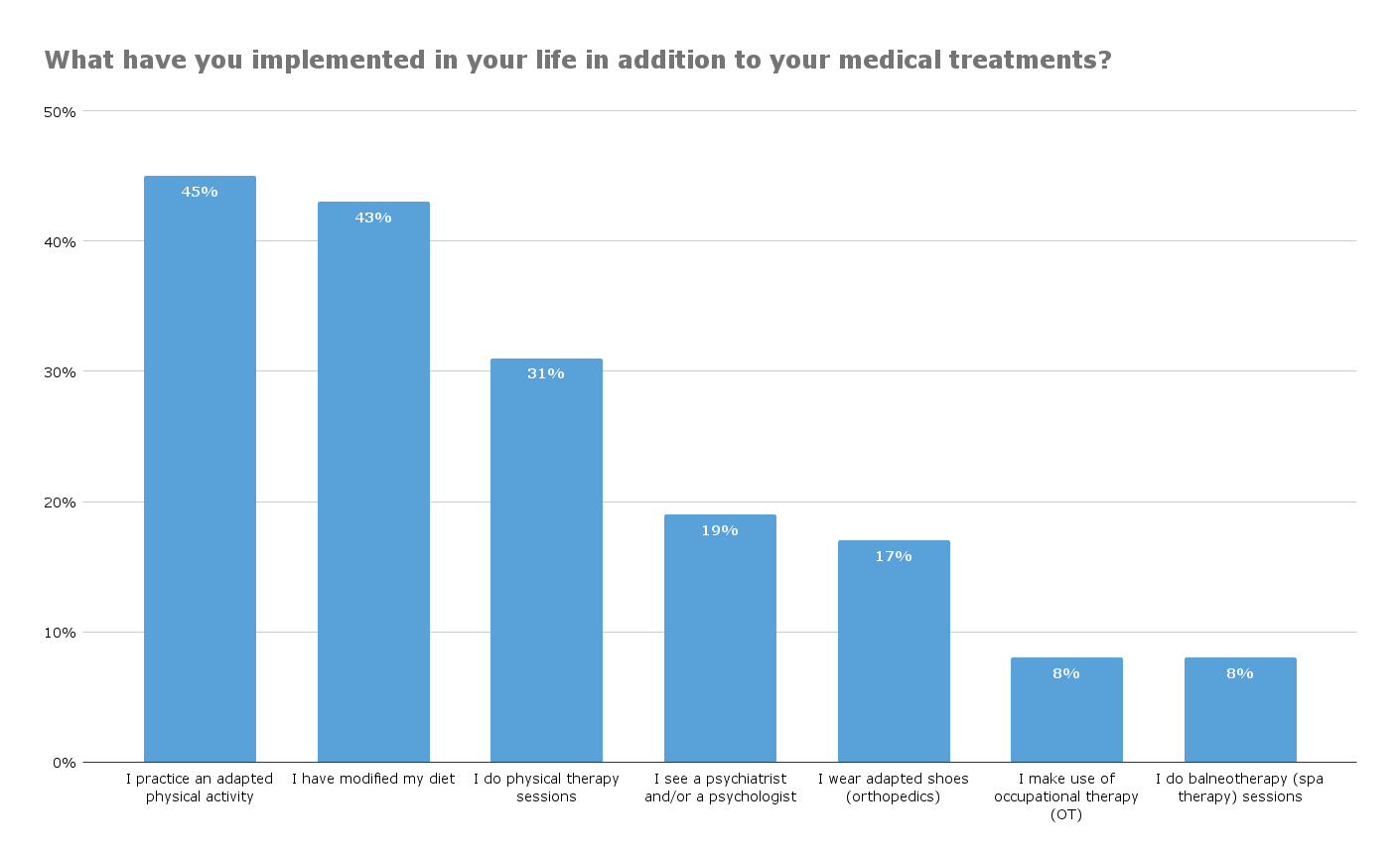
Indeed, 45% of them practice an adapted physical activity, 43% have modified their diet, 31% engage in physical therapy sessions, 19% see a psychiatrist or psychologist, 17% wear adapted shoes, and 16% turn to occupational therapy and/or balneotherapy.
Expert advice on living better with rheumatoid arthritis
Stay physically active
When you have rheumatoid arthritis, it is important to maintain sufficient physical activity while avoiding unnecessary strain on your joints, particularly during inflammatory flare-ups.
Regular physical activity can include walking, cycling or swimming, but always at your own pace. If the pain reappears during the activity, do not be discouraged, but wait for the pain to subside.
It is recommended to do a short exercises session every day. Exercising the hands can keep the joints in the fingers and wrists flexible. Targeted exercises for the legs will help maintain strength in the muscles that support us in a standing position and whilst walking.
Rest during flare-ups
During a flare-up, you should rest the affected joints. Inflammation, which results in joint pain and swelling, makes the joint more fragile and can cause it to become deformed during exercise. It is therefore advisable to take certain precautions while waiting for medication to take effect.
The inflamed joint should be used as little as possible during the day and rested in the correct position at night. The correct position is not the one that most reduces pain, but it should preserve the function of the joint by avoiding stiffening.
Keep an eye on your diet
Diet is an area of significant research, but nothing has yet been proven. Indeed, there is no standard diet for all patients. However, it is important to follow certain dietary guidelines and it is recommended to consult a nutrition specialist at least once.
In rheumatoid arthritis patients, muscle wasting and osteoporosis are frequently observed, which may be due to inflammation, inactivity or high-dose cortisone treatment.
Diet can help prevent these complications and even restore good muscle and bone condition. A diet rich in calcium and an adequate supply of vitamin D can help prevent muscle wasting and osteoporosis, in addition to regular physical activity.
Sources:
Carenity survey conducted from 2 to 21 November 2021 in France, the UK and the US
Arthritis, NHS
Polyarthrite rhumatoïde : traiter tôt pour protéger ses articulations, Pourquoi Docteur
1 comment
You will also like

Rheumatoid arthritis: "I never tried to accept the disease but to move forward"
20 Mar 2021 • 5 comments

 Facebook
Facebook Twitter
Twitter


